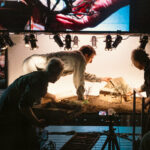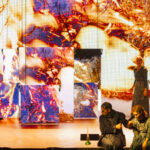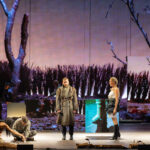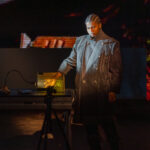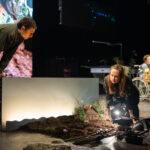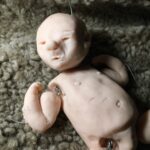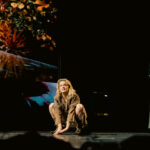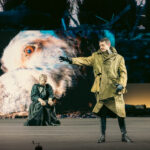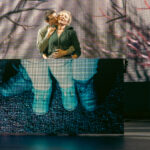

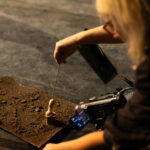
- Premiere Year 2023
Hotel Modern and director Guy Cassiers, together with 11 actors from the ITA (International Theatre Amsterdam) ensemble, create the world of Primeval and Other Times: in models and live on several video screens, life in the village and the surrounding nature is created. The whole is a tableau vivant of epic proportions that does justice to the layered world of the novel.
Nobel laureate Olga Tokarczuk ingeniously brings to life a Polish village where residents try to survive the effects of two world wars, communism, and the advent of modernity. Several generations of villagers start families, build houses, and try to resist the violence of history and nature as best they can. Birth, growth, decay, and death affect all creatures - trees, spirits, and animals in addition to humans - and are described with compassion and gentleness. Tokarczuk shows that every human being is completely unique, searching for meaning and purpose.
Director Guy Cassiers gained fame with performances in which video plays a central role and in which the actors constantly switch between acting and storytelling. At ITA, he previously made Hamlet versus Hamlet (by Tom Lanoye), The Kindly Ones (after Jonathan Littell), May we be forgiven (after A.M. Homes) and Lehman Trilogy (by Stefano Cassini).

DIGITAL BROCHURE of Primeval
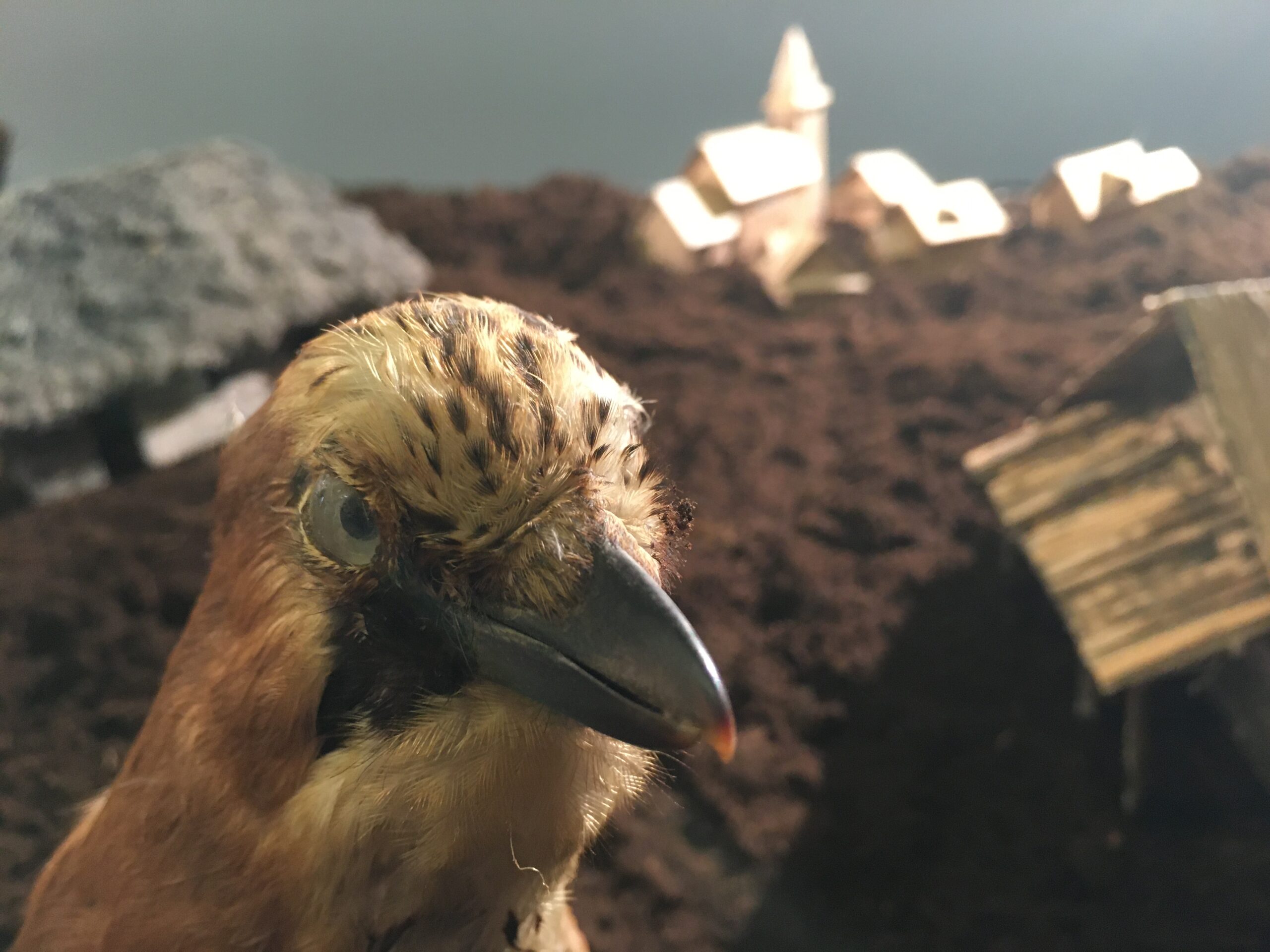
-
Reviews & articles
-
This collaboration between ITA Ensemble and Hotel Modern delivers spectacular, eye-catching and unique theater
Hotel Modern creates a kind of life-size viewing boxes in different sizes and in various layers that offer the actors something to hold on to to shape the actual story. The result is a kaleidoscopic set of ever-changing perspectives; small here and there, when a baby is born, or when a couple in love goes for a walk. Then big again, when a house is built, or when the village grows into a city. Add sounds and smells to this, and an experience is created in which the senses of the spectators are explicitly stimulated
by Mieke Zijlmans, 8Weekly Read More
December 15, 2023
At the beginning of the twentieth century, the Polish countryside envelopes its inhabitants like a warm blanket, even though it is quite primitive. The balance of power is clear, everyone knows where they stand. Then that image changes, hostility and distrust displace solidarity. With Primeval and other times, director Guy Cassiers adds an impressive family epic to his oeuvre. It is difficult that Genowefa’s husband (Chris Nietvelt) keeps not returning from the battlefield of the First World War, because she is pregnant and her body longs for love. But otherwise, little seems wrong in the fictional Polish village of Primeval, dating from 1917. There is a castle in which the – slightly religiously insane – landlord Popielski (Gijs Scholten van Aschat) resides; he represents the elite. Genowefa runs the mill and represents the middle class. With prostitute Aartje (Laura de Geest), good family men get their money’s worth. It’s not ideal, but it’s clear. This is how Primeval and Other Times begins, based on the book by Olga Tokarczuk, winner of the Nobel Prize for Literature in 2018. The narrative is reminiscent of The Years of Annie Ernaux, previously translated into a stage performance by director Eline Arbo. But where Ernaux links the course of history to one biographical life, Tokarczuk presents that of the residents of an entire village. How did those residents fare in the course of the twentieth century? Spectacle Director Cassier turns Tokarczuk’s story with the ITA Ensemble and Hotel Modern into an overwhelming visual spectacle. The contribution of Hotel Modern is decisive in this. This company has made its mark by building live dollhouse-like models full of people and animals that become backgrounds and foregrounds with the help of cameras and life-size projections. In Primeval and other times, Hotel Modern creates a kind of life-size viewing boxes in different sizes and in various layers that offer the actors something to hold on to to shape the actual story. The result is a kaleidoscopic set of ever-changing perspectives; small here and there, when a baby is born, or when a couple in love goes for a walk. Then big again, when a house is built, or when the village grows into a city. Add sounds and smells to this, and an experience is created in which the senses of the spectators are explicitly stimulated.
Progress
As long as the balance of power in the village of Primeval is clear, life continues. Genowefa and her Pawel have children. So does prostitute Aartje, but her life is less balanced. Landlord Popielski leads his comfortable life. Until the crisis breaks out, another brutal war ensues, and residents cross the village border and leave the marked paths. In the undercurrent, Oer and other times question whether ‘progress’ is so beneficial. Anyone who leaves the familiar community embarks on a questionable adventure. Without claiming that everything was better in the past, the run on everything that is bigger and more expensive does not necessarily make the residents of Primeval happier.
Handwriting
In everything in Primeval and Other Times we recognize the ‘handwriting’ of Guy Cassiers. Last season he directed the family epic Lehman Trilogy at ITA Ensemble, about the extremely wealthy American banking family that was at the origin of the banking crisis of 2008. However, not only the telling of family stories is a common thread in his work, but also the overwhelming use of video, cameras, projections. Cassiers, for example, already applied this method of storytelling in his legendary Proust four-part painting at – previously – the Ro Theater. Cassiers often brings his actors forward one by one to tell their story. With Chris Nietvelt, Gijs Scholten van Aschat, Eelco Smits, Janni Goslinga, Daniël Kolf, Minne Koole, Ilke Paddenburg, Maarten Heijmans, ‘Ntianu Stuger and Frieda Pittoors, Cassiers has a very strong cast at his disposal. In the semi-darkness between the models to be filmed, Pauline Kalker, Arlène Hoornweg and Herman Helle of Hotel Modern can be recognized. Parallel It is a pity that Cassiers’ narrative form means that the life stories are often told in parallel, next to each other and therefore rarely ‘meet’ each other. In addition, the narration follows approximately the entirety of Tokarczuk’s book, making the performance last about two and a half hours, which is very long. On the other hand, the part before the break in particular really hits home, the spectators are more or less blown away by the story and images. You can therefore forgive Cassiers for the somewhat slower second half. This collaboration between ITA Ensemble and Hotel Modern delivers spectacular, eye-catching and unique theater.
-
Ultimately, the old coffee grinder is the only one still running, unaffected by the violence of time
The actors perform between several meticulously constructed models on stage, the images of which are projected on various screens. Sometimes they play these miniature plays themselves, for example by walking through them with their fingers. That does something with perspective and proportion. A huge sea of fire is hell for those standing in the middle of it: through large projection screens you can see all-consuming flames clawing around them like monsters. But at the same time, from a distance you see the model on fire, and it is nothing more than an innocent fire that flares up and goes out
by Sander Janssens, Volkskrant Read More
December 14, 2023,
Mycelium grows under the entire village. The hyphae are also called the life of death. The residents of the fictional Polish village of Primeval grow up between world wars, natural disasters and the promises of modern existence. “Man is stupid and must learn,” says outcast Aartje, a prostitute who lives in the woods and whom the men abuse with guilt and shame. Stay informed Get notified of important news In Primeval and other times, based on the novel of the same name by Nobel Prize winner Olga Tokarczuk, International Theater Amsterdam collaborates with theater group Hotel Modern, known for their live-filmed object theater. The actors perform between several meticulously constructed models on stage, the images of which are projected on various screens. Sometimes they play these miniature plays themselves, for example by walking through them with their fingers. That does something with perspective and proportion. A huge sea of fire is hell for those standing in the middle of it: through large projection screens you can see all-consuming flames clawing around them like monsters. But at the same time, from a distance you see the model on fire, and it is nothing more than an innocent fire that flares up and goes out. “People think they live more intensely than animals, plants or things,” says the character Misia (Janni Goslinga), who received an old coffee grinder from her father. ‘But perhaps this coffee grinder is the pivot around which everything revolves, and is more important to the world than people.’
She sees childhood sweetheart Pawel (Minne Koole) as an escape from a hopeless existence, but he is no more able than the generations above or below him to resist the temptations of modern life. The fungus is everywhere in the soil here.
In addition to the live projections, director Guy Cassiers and text editor Peter van Kraaij looked for a way to zoom in and out in language. The characters regularly switch from lived scenes in the moment to an omniscient narrative perspective, in which they talk about their own fate as fait accompli. Here too you get the feeling that man is not the acting linchpin of existence, but a set piece in larger movements, preconditions in which violence can flourish and flaring ideologies can manifest themselves in all their intensity.In ‘Primeval and Other Times’ you can see the all-consuming flames clawing around them like monsters through large projection screens.
While the fluttering anecdotes, the spoken language and the shifting image projections irrevocably create distance and alienation, some actors, in their playful interaction with their characters, draw the performance into the moment. The loving one-two punches between Aartje’s daughter Ruta and the lonely Izydor are beautiful. In a world adrift and against the laws of logic, a deep bond arises between them, which – as it goes – will ultimately hurt a lot. ‘Ntianu Stuger and Maarten Heijmans portray these characters with lightness, compassion and precision, and contrast all the violence of war with the immeasurable power of humanity. Laura De Geest also impresses with the idiosyncratic way in which she portrays Aartje: a hurt, but very strong woman who places herself on an equal footing with nature and, in contrast to her environment, draws strength from it.
Primeval and Other Times is a particularly moody and dark piece, which, although brooding, often feels directionless. In the more than three hours that the performance lasts, a lot could have been cut. In the second half, time speeds up, but the anecdote still finds a nice focus in the steady but inevitable decline of Izydor. The resignation with which Heijmans portrays the all-encompassing loneliness of his character is chilling. Heijmans once again proves that he belongs to an outside category as an actor.
Like the mycelium, intergenerational traumas continue to proliferate in Primordial and other times: villagers are driven from their native land and their loved ones; good people turn into distrustful loners. These are the wounds that time makes.
Ultimately, the old coffee grinder is the only one still running, unaffected by the violence of time. Maybe Misia was right and after all, it’s not all about us. -
A kaleidoscopic beauty
I have rarely seen such a large ensemble with so many great actors so modest and approachable. The patchwork of embodied stories, in which the world between people is made up of stories, and with each of them the world keeps turning, a world that depends on who tells the story and how they listen, gives 'Primeval and other times' a kaleidoscopic beauty.
by Fransien van der Putt, Theaterkrant Read More
13 december 2023
While ITA’s old hall fills with premiere audiences, there are also people walking around on stage. They are busy putting things in order in various places around the empty playing floor. Anyone who knows the work of Hotel Modern knows that they must be miniature theaters that are being finalized.
For example, there is the arrangement of twigs, leaves and loose black earth in what from a distance looks like a huge terrarium. It also apparently contains a conveyor belt of clear plastic with some green tufts of paper. While rotating and with the right lighting, the moving plastic becomes a river, just as the twigs and the earth become a forest, or a battlefield. The camera blows up the miniatures into grand scenes and intense close-ups.
Guy Cassiers invited Hotel Modern for his staging of Primeval and other times, a book by the Polish writer and Nobel Prize winner Olga Tokarczuk from 1996. The novel, adapted for this occasion by dramaturge Peter Van Kraaij, is about a small village somewhere in Poland . It has been visited by wars and revolutions over the decades, just as the seasons and generations follow each other.
Primeval is an achaic place, as we soon learn. There is a forest and a river, there are fields and a water mill on the river to grind the grain. People live in stone houses and huts, and there is a large landowner who lives in a palace. His wife (or is it his daughter?) does good works and watches the money, while the master of the house is lost in thoughts of a philosophical and theological nature.
The opening of the performance – the stage initially remains bare like a tidy stage workshop, but here and there a screen comes down from the grid – is done by Pauline Kalker of Hotel Modern. Dressed in starched black skirts and aprons, her gray hair in a bun that is as modest as it is manageable, she explains where Primeval lies, not in relation to what we know, but entirely from within. To the north lies the temptation of escape through a main road, to the south if I remember correctly there is a town where the danger of greed lurks. To the east and west the village is bordered by the river and the forest, each of which also has an enchanting effect on the villagers.
Kalker, Arlène Hoornweg and the others from Hotel Modern do not play any roles in the story, but they are about the flow of the images and the hands that arrange and film those images live. The thirteen actors of ITA participate. There are also many screens, as well as the places where filming takes place, right up to the front stage. Making and doing gives a special energy to the performance, of working diligently, quietly, no matter what happens – as is the case with work in the fields and on farms.
But the images – sometimes one that is spread across different screens, but often different stories are supported with images at the same time – also create distance. It is as if you, as a spectator, are being read to before going to sleep or being chatted at the kitchen table with your coat still on by the neighbor. The dramatic stuff comes close, but it always remains a story as if from a book or a photo album, which can be closed and put away at any moment.
The tone of the performance begins in a homely, motherly atmosphere. After Kalker there are the excellent Laura De Geest and then also Chris Nietvelt, who both assume the same role for the entire three hours (including intermission), unlike many of the other actors. Cassiers allows many people to switch roles, often within one family line or professional group. This creates quite a bit of puzzling for the viewer, which also forces them to surrender to how things come and go. Almost chatting, the players tell the audience and each other where they have ended up, how it once was or came to be that way. They often sigh and wonder where it will go. Time and the scenes initially don’t really seem to move in any direction. Men are seduced, children are born, bread needs to be put on the table, everything in due time.
But from the opening, the play also has an ominous charge, it is pregnant with what is to come, the characters are already tired and secretly desperate about what was. Not again, not again, there seems to be many scenes underneath. The matter of God and of people must be mentioned, says Kalker, from the perspective of people who, as Chris Nietvelt says a moment later in her role as miller’s wife Genowefa, did not experience a war themselves, but at most witnessed some fights in the village. The miller then has to return from the war, while his wife settles in with a new servant, beautifully played by Daniël Kolf.
From the stories of the villagers – who are each other’s families and neighbors, but sometimes also come from far away, such as the woman who meets the men from the café for drinks and food or the Russian soldier (or was it a German? ) – it turns out that we are at the beginning of the twentieth century. It starts well before or during the First World War, and then it rages on. Jewish families also live in the village, I don’t actually know what you call the others. Catholics, ordinary Poles?
Cassiers regularly plays with the outsider’s perspective, just as Tiago Rodrigues did beautifully in his Cherry Garden. Also in Primeval , Jewish and other ‘others’ are played by actors of color, while a Jewish-looking actor plays the German occupier, or was it a Russian liberator? This aspect also adds confusion and distance to the colorful collection of recurring suffering and essence. It also brings the stories and views into a present day steeped in postcolonial questions.
While the characters cannot see much further than the edge of their village, the audience sees with the knowledge of today. But it in turn becomes entangled in the multiplicity of relationships and generations. The events do not develop through a central conflict, but meander in parallels and variations, inherited and new minor and major suffering. Ultimately, Genowefa’s son Isidoor and Ruta, the daughter of the prostitute who has gone to live in the forest, form a certain thread through the play. Both, in their own way, leave the battlefield prematurely, while others have to drink the cup to the last breath, after the Germans have come to take the Jews from the village, and the liberating Russians cause yet more misery in their moment. Through a shared refuge in the elder tree in front of the house, part of the story takes place in the forest, where the two ask questions, just like the old landlord does from his armchair. In the end, an earthworm is really the only constant in this story. He continues to dig even when the forest has become scorched earth after a blaze.
Infidelity, hypocrisy, illegitimate children, pedophilia, paternalism, sexism, rape, infanticide, racism, genocide – all conceivable plagues, forms of corruption, abuse of power and acts of violence are discussed, literally as if on a merry-go-round, although the performance, following Tokarczuk, uses – I assume – the metaphor of a coffee grinder. People are like a coffee bean, small and insignificant, but powerful little units when roasted thoroughly. The mill continues to turn and grind. The game with the rules, the dimensions of good and evil, connected to what is close (family, neighbors, giving birth) and what seems far away or comes from far away (the war, the others, the revolution, modernity, capitalism ), is discussed again and again.
The hours in the theater fly by, like the days and years in the story. The acceleration of things and the more active play after the break suggests the new age, with technicolor and new-build flats in the fields. There are always new rounds and new opportunities. Modernity arrives with communism, the elderly slowly go crazy, the young people do a new round, see new opportunities and burn their fingers again.
Tokarczuk’s novel, said to be composed of fragments, has been translated by Cassiers and co into a quietly turning, but equally crushing mill. There are no heroes, or everyone is one. There are many victims, but on the scale of the village their stories can still be told. In the 1984 Spanish film Los Santos Innocentes by Mario Camus, people have to leave their village in order to one day perhaps change the feudal relationships with which they grew up in Franco’s post-war Spain. Also in Primeval. When people leave their village, are they able to make something new, something better of their lives?
When the war blows across the fields, just before the break, when the screens on stage turn white, when nothing remains of the birch groves and the village is hit by a sea of fire, a storm of sand and ash, I can’t help but feel thinking about the people in Gaza, and about the people in Ukraine, and about all those people whose homes and homes are turning into a battlefield, without even wanting or thinking about it for a moment. How many more deaths, how many wars, how many technicolor revolutions do we have to endure before that silly coffee grinder produces something other than brown goo, scorched earth?
The last scene is again on a dilapidated stage, after the modernized world of antibiotics and motorized transport, immigration and mass consumption does not necessarily seem to offer relief. The war and fighting move to other parts of the world, people continue to suffer. Perhaps it is hopeful, that last gesture, that we can see the world as a representation, a box with tools and figures to put together scenes. As we want to imagine it beyond the crushing recurrence of old moves. Perhaps the performance ends on an optimistic note, but it is so modest that you hardly hear it.
I have rarely seen such a large ensemble with so many great actors so modest and approachable. The patchwork of embodied stories, in which the world between people is made up of stories, and with each of them the world keeps turning, a world that depends on who tells the story and how they listen, gives Primeval and other times a kaleidoscopic beauty.
-
Life, with its thousand anecdotes, goes on.
The performance clearly bears the signature of Guy Cassiers. His collaboration with Hotel Modern has resulted in a series of catchy, surprising images. They make the narrative, image after image, concrete. With the players of the ITA company, he has a beautiful instrument in his hands.
by Johan Thielemans, Etcetera Read More
December 14 2023
In Primeval and Other Times, Polish Nobel Prize winner Olga Tokarczuk takes you to a village where the inhabitants try to survive the consequences of two world wars, communism and the advent of modernity. How do they resist the violence of history and nature? In the hands of Guy Cassiers and Hotel Modern, the result is technically masterful theatre that rejects major dramatic conflicts.
Primeval and Other Times (1996) is one of the first novels by Nobel Prize winner Olga Tokarczuk. For director Guy Cassiers, Peter van Kraaij has made a clever stage version of it. It has become a text that intertwines narration and empathy. For example, the players use two registers. The complexity is increased because the different performers play multiple roles. In this way, the makers were able to do justice to the numerous storylines that together form the portrait of a small village in Poland. The village is both a safe place and a prison.
When we enter the room, we see an empty plateau. There are some people walking around preparing indeterminate little things. If you look closely, there is a scale model of houses to scale at the back. Then Chris Nietveld comes to the fore and leads us into the world of the Polish writer Olga Tokarczuk. We are in the village of Primeval, somewhere lost in Poland. The back wall has now come to life. When we look around, we see someone with a tiny camera filming a tiny model of a watermill. Immediately we see that Hotel Modern is at work. In addition to the actors, the three members of the Rotterdam collective will form an essential part of the performance.
Everything that is quoted or described in the texts will become concrete on five moving screens. Sticks and twigs will be transformed by the camera into forests and landscapes. We will see flowers, and trees that will be snowed under. A pile of twigs and dry leaves are set on fire with a Bunsen burner, and on the screen we see the world go down in fire. A house is built with care – in a kind of aquarium. When the destruction of the Second World War breaks loose, a pandemic breaks loose, with flashes of light and electronic effects, which flatten the viewer just before the intermission.
In the second part, a house is built – in a kind of aquarium – but overwhelmingly ‘real’ on the screen. We have arrived in modernity, and now a car drives by on the screen. A doctor rides a motorcycle in search of medicine – a combination of screen and person. Everything here is technically masterful.
On the screens, all this creates a cinematic realism. But on stage we can always see how the image is made. It is a game of making and creating illusion, something that fits in perfectly with the vision of director Guy Cassiers. It involves the viewer and at the same time places him at a distance. Let me call this ‘double viewing’, which makes for an honest experience. For three hours, Hotel Modern will let the viewer stay in the village of Primeval.
THEOLOGICAL REFLECTIONS
The various inhabitants of the village will tell their vicissitudes. In Peter van Kraaij’s novel adaptation, this happens in short scenes, in which the actors are mainly narrators. They use two registers: either they message from the outside, or they empathize with a character. Short pieces form a puzzle, in which the focus is not on the people but on the village. As a result, the numerous storylines remain side by side. Time slips by with small and big problems.
We see this in the story of Genofewa (Chris Nietveldt), whom we follow from the moment she has children until she is in a wheelchair and dies. We first meet her in 1917. She has to take care of the miller’s business on her own, because her husband is at the front. She is the first strong woman of the play. A boy comes along and falls in love with her. She will give birth to a bastard. In the further development of this story, you can expect a great tragedy when the husband returns. But this love triangle is no more than an anecdote about life as it is. A summary of this philosophy of life can be found in the words of daughter Floortje: ‘People think that the cause of the madness is a great and dramatic event, a kind of suffering that cannot be tolerated. But that’s not the case.’ This rejection of major dramatic conflicts determines the atmosphere of the evening. More important is the passing of time and having children. In this way, Tokarczuk forces us to take a mild look at the villagers.
As time passes, so do the miserable times of the twentieth century. There is the passage of a German soldier. He briefly describes what Nazism stands for: for him, a general cleansing of society is necessary. Later we learn that he has been shot. After the war, the communists appeared. They take over the possessions of the large landowners. In Oer, this is Popielski. However, he is not concerned with politics, but with religion. A rabbi gives him a book, from which he reads. They are alternative Bible stories. For example, the book says that the conflict between Cain and Abel ends with the murder of Abel. The central question is whether God exists. Perhaps he is just a figment of man’s imagination. Some heretical, or gnostic versions of the Bible stories, are subjects that are very much of Tokarczuk’s concern, because it is a matter that she has explored further in other novels.
EXPLOSIONS OF STARS AND BLACK HOLES
The various passages from the book will be read by Gijs Scholten van Aschat. Since he gives the texts an ironic twist, these theological reflections have become light-hearted interludes, brilliantly performed. Finally, Popielski takes refuge in madness, without politics playing a special role.
Due to the large number of characters, Tokarczuk can touch on a number of themes, which remain side by side. There is the interest of children, the interest in nature, the threat of the forest, the resistance to social change, the fear of the city. Very important is the procession of strong women.
A very special character is Izydor, played soberly and with great intensity by Maarten Heijmans. He is an outsider, the great lonely of the village. In the end, he dies in full consciousness of the loss. The spaces inside, he says, “fell apart into small pieces.” Dying is then “a destruction that was many times more terrible than anything else, than war, than fires, than explosions of stars and black holes.” In this way, Tokarczuk juxtaposes the dramas that take place in the world with personal suffering. The worst thing is the disappearance of the individual, who leaves no trace.
This pessimistic note does not conclude the piece. In the final scene, Adelka (Ilke Paddenburg) returns to the village to take care of her old father Pawel (Minne Koole). It’s the only truly tender moment of the evening. For the very last image, a symbolic element is used. At the beginning of the evening, grandfather Michal (Eelco Smit) brought an old-fashioned coffee grinder. It has remained in the family and is now brought out by granddaughter Adelka. It is an ambiguous image, from the structure of the depiction the coffee grinder functions as a closure, a circle that is complete. The twisting motion of grinding can also mean: life, with its thousand anecdotes, goes on.
The performance clearly bears the signature of Guy Cassiers. His collaboration with Hotel Modern has resulted in a series of catchy, surprising images. They make the narrative, image after image, concrete. With the players of the ITA company, he has a beautiful instrument in his hands. His search for some understated honesty can be found in everyone: that applies to the well-known members of the company. Someone like Frieda Pittoors strikes an overwhelming truth in a few brief interventions. But newcomers such as Laura De Geest, Daniël Kolf or ‘Ntianu Stug are also convincing and fascinating as characters and storytellers. In this way, this performance is stylish in all areas. All choices made form an aesthetically pure whole. This stay in the village of Primeval is one of the strongest performances that Guy Cassiers has made in his rich career.
-
Tourdates Primeval and other times
- View all our tourdates in the agenda
-
Makers
-
Based on the novel Primeval & Other Times from Olga Tokarczuk
director Guy Cassiers live animation Hotel Modern adaptation and dramaturgy Peter Van Kraaij cast Pauline Kalker, Arlène Hoornweg, Chris Nietvelt, Maarten Heijmans, Janni Goslinga, Gijs Scholten van Aschat, Laura De Geest, Eelco Smits, Ilke Paddenburg, Minne Koole, Frieda Pittoors, Daniel Kolf, ‘Ntianu Stuger maquettes Herman Helle, Arlène Hoornweg, Marsha Agerbeek, Juliet Campfens, Dick Vroemen mask Kirsten Hutschemakers video Pablo Strörmann camera Robbert So
Primeval & Other Times is a coproduction of ITA and Hotel Modern




